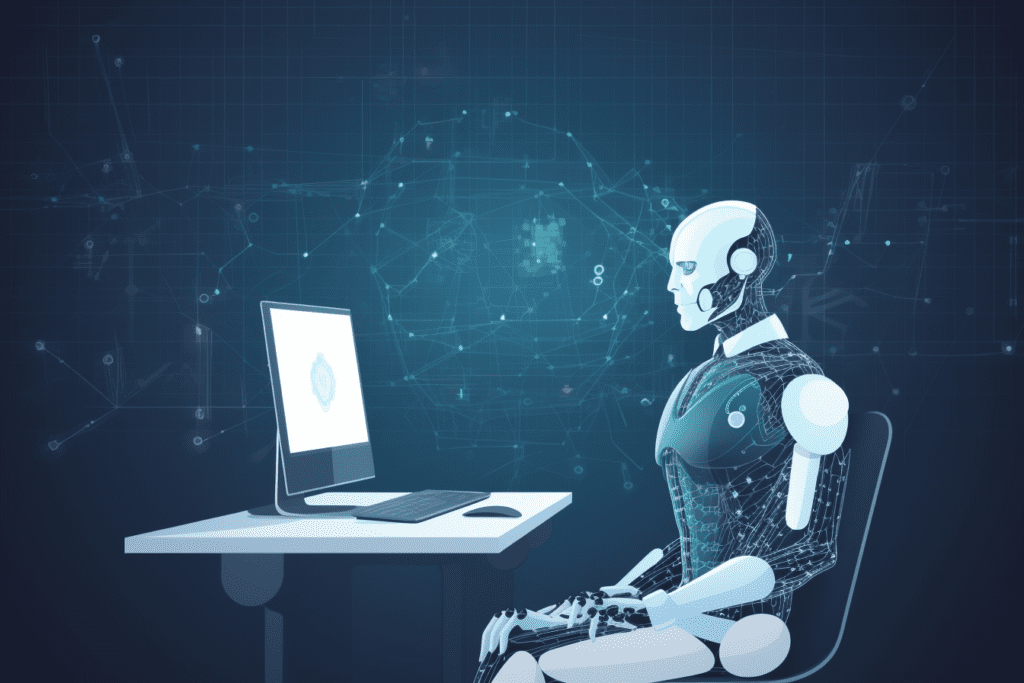The Future of Jobs Market: How AI will affect Jobs?
Artificial intelligence (AI) is a rapidly advancing technology that has the potential to revolutionize many aspects of our lives, including the job market. While AI has the potential to automate certain tasks and improve workplace efficiency, it also raises concerns about job displacement, job quality, and bias. In this article, we will explore How AI will affect jobs and discuss this technology’s potential benefits and drawbacks.

The Benefits of How AI will affect jobs
One of the main benefits of AI is that it can automate repetitive or tedious tasks, freeing up human workers to focus on more complex and creative work.
For example, AI can be used to analyze large amounts of data, identify patterns and trends, and make predictions about future outcomes. This can be particularly useful in fields such as finance, healthcare, and marketing, where data analysis is a critical part of the job.
AI can also improve workplace safety. For example, AI-powered robots can be used to perform dangerous tasks, such as working in hazardous environments or handling toxic materials. This can reduce the risk of injury or illness for human workers.
AI and Data Analysis
AI has the potential to revolutionize data analysis in many industries. By automating the process of data analysis, AI can help companies make more informed decisions and improve their bottom line.
For example, in the finance industry, AI can be used to analyze market trends and make predictions about future stock prices. In healthcare, AI can be used to analyze patient data and identify potential health risks.
However, there are concerns about the potential for AI to perpetuate bias and discrimination.
AI systems are only as unbiased as the data they are trained on, and if that data reflects existing biases and inequalities, the AI system will perpetuate those biases.
For example, if an AI system is trained on data that reflects gender or racial biases, it may make decisions that discriminate against certain groups of people.
AI and Workplace Safety
AI can also improve workplace safety by automating dangerous tasks. For example, in the manufacturing industry, AI-powered robots can be used to perform tasks that are too dangerous for human workers, such as working with heavy machinery or handling toxic materials.
This can reduce the risk of injury or illness for human workers and improve overall workplace safety.
However, there are concerns about the impact of AI on job quality. Some experts worry that the automation of specific tasks could lead to a “hollowing out” of the job market, with low-skilled jobs being replaced by machines and high-skilled jobs becoming more specialized and demanding. This could lead to a widening income gap and job insecurity for workers.
The Drawbacks of AI in the Job Market
One of the main drawbacks of AI is the potential for job displacement. As AI becomes more advanced, it has the potential to replace human workers in certain industries. For example, self-driving cars could eventually replace human drivers, leading to job losses in the transportation industry.
Similarly, AI-powered chatbots could handle customer service inquiries, reducing the need for human customer service representatives.
Another concern is the potential for AI to perpetuate bias and discrimination. As mentioned earlier, AI systems are only as unbiased as the data they are trained on. If that data reflects existing biases and inequalities, the AI system will perpetuate those biases.
This could lead to discrimination against certain groups of people in hiring, promotions, and other employment decisions.
AI and Job Quality
There are also concerns about the impact of AI on job quality. Some experts worry that the automation of specific tasks could lead to a “hollowing out” of the job market, with low-skilled jobs being replaced by machines and high-skilled jobs becoming more specialized and demanding. This could lead to a widening income gap and job insecurity for workers.
However, there are also potential benefits to AI in terms of job quality. By automating certain tasks, AI can free up human workers to focus on more complex and creative work. This could lead to more fulfilling and rewarding jobs for workers.
Conclusion
In conclusion, the impact of How AI will affect jobs market is complex and multifaceted. While AI has the potential to automate certain tasks and improve workplace efficiency, it also raises concerns about job displacement, job quality, and bias.
To ensure that AI is used in a responsible and ethical manner, it’s important to consider the policy implications of this technology and to invest in education and training programs to help workers adapt to a changing job market.
Read too, The Impact of Artificial Intelligence with Examples of Human Replacement by AI.
Sources
Washing Post: Opinion Type in your job to see how much AI will affect it
Forbes: Artificial Intelligence Jobs: How Will AI Change The Job Market?
American University: AI and the Future of Work in the United States